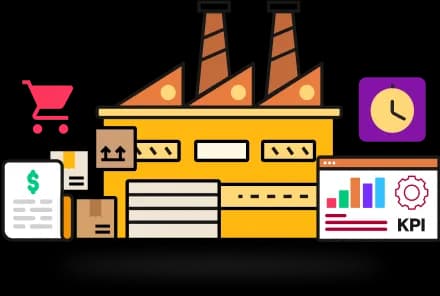Industry
Industrial Manufacturing
High Tech & Electronics
Footwear Manufacturing
Apparel & Textiles
Food & Beverage
Rubber & Plastics
Metal Fabrication
Industrial Machinery & Equipment
Construction & Engineering
Furnitures & Fixtures
Medical Device Manufacturing
Automotive Manufacturing
Aerospace And Defence
Screw Shop Manufacturing
Spring Shop Manufacturing
Solutions
Pricing
Resources
Company
GST Legacy
GST Implementation in India
The implementation of the Goods and Services Tax (GST) in India was not an overnight thought. The introduction of the tax reform has demanded both time and patience and is expected to significantly affect the Indian economy. The seeds of GST in India was first sown in the year 2000 by Atal Bihari Vajpayee, who was the then Prime Minister of the nation.
A step further in 2005, the then finance minister P. Chidambaram, in his parliament budget session, announced that there was a serious requirement of tax reforms in India in the area of indirect taxation. Next in 2010, the then finance minister, Pranab Mukherjee, in his budget session addressed to the nation that the GST will be introduced in April 2011.
In the budget session of the year 2011, the 115th constitutional amendment bill was introduced in the Lok Sabha for levying the GST on all goods and services, other than some specified goods which were to be kept outside the GST boundary for the benefit of the general public. Ultimately, in 2014, the GST bill was passed in Lok Sabha as the 122nd constitution bill. And in 2016, the bill was passed in the Rajya Sabha as well.
GST Implementation Date
The rollout of the GST has been deferred from its initially intimidated date of April 1, 2017. The delay has been attributed to the hefty issue of dual control, which has clogged the way. The government is now willing to implement the significant taxation reform from July 1, 2017, which is only three months away from the previously speculated timeline.
According to Economic Times, this has implications for the Budget, which was not expected to include targets for central excise and service tax. These taxes were supposed to be subsumed within the GST, which the Centre was hoping would roll out on the first day of the new financial year.
Read More: Government extends deadline for registering on GST portal.
While the new dates will delay the rollout, they are within the mandatory deadline of September—after which the central and state governments will lose powers to levy any indirect taxes other than the GST. However, it can be implemented anytime even though its implementation from the beginning of the fiscal year would have been easier.
The Centre and States have agreed to share the entire taxation base for evaluation with a horizontal division. The formula which will apply for both goods procedures and service providers. States will have the power to assess 90% of all assesses with a GST turnover of Rs. 1.5 crore or less. The rest will be with the Centre. Assesses with a GST turnover of over Rs. 1.5 crore will be assessed in a 50:50 ratio by the Centre and States. Except for special provisions, only the Centre will levy and collect Integrated GST (IGST), wherein the States will also be cross-empowered. In the combative issue of place of supply in IGST for States, the assessment will be done by the Centre.
GST will be a comprehensive indirect tax on consumption of goods and services throughout India, to replace taxes levied by the central and state governments. The GST is consumption based tax levied on the supply of Goods and Services which means based on the input tax credit method, it would be levied and collected at each stage of sale or purchase of goods or services. Once it is in force, GST will replace at least 17 state and federal taxes.
Get Started with Deskera
Benefits of cloud business software
- Productivity
- Implementation
- Mobility
- Scalability
- Security
See related articles about India GST
What our Customers Say About Us
Whatever your business
size, Deskera enables you to
simplify operations across
business functions. Here's
what our customers say
about us.


At GoDo, we understand that managing our finances and customer relationships is essential for our success. Deskera has provided us with an easy to use and intuitive platform that has enabled us to access our financial data, track customer relationships, and manage our finances with ease. We have been able to streamline our processes, better manage our finances, and stay on top of our customer relationships. We highly recommend Deskera to any business that is looking to stay organized and efficient.
Wesley Wright
CEO, GoDo Life


We are extremely pleased with our decision to switch to Deskera and have seen a significant improvement in our business operations since making the switch. The sales process was smooth from start to finish and customer support at every step of the implementation was stellar. Highly recommend Deskera to those looking for a great ERP solution.
Wally Mears
CEO, The Jungle

We implemented Deskera's integrated platform to improve our procurement and inventory management processes to streamline our operations and improve efficiencies. I highly recommend their platform to any company looking to accelerate their growth.
Scott Phetsalod
Laboratory Manager
Run Your Business With Deskera

Products
Use Cases
 , India
, India  , Singapore
, Singapore  , and Canada
, and Canada  with
with 


